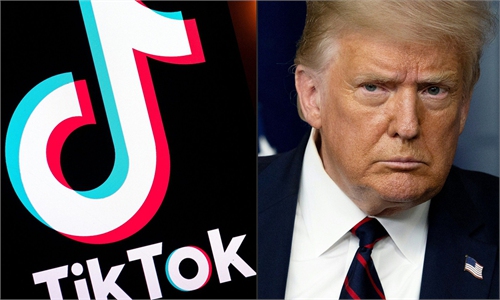
Medea Benjamin Photo: Code Pink website
Editor's Note:
The US new cold war offensive against China has aroused opposition and been denounced by scholars and activists from many countries around the world. Medea Benjamin (Benjamin), an American political activist who co-founded the US anti-war organization Code Pink and the fair trade advocacy group Global Exchange, is one of them. Global Times (GT) reporter Yu Jincui talked to Benjamin on issues such as why the US new cold war offensive should be condemned and stopped and what has gone wrong with the US China policy.
GT: US Secretary of State Mike Pompeo's speech at the Nixon Presidential Library was widely regarded as a declaration of a new cold war against China. In your opinion, has a new cold war begun between China and the US? Will US society support the government to launch a new cold war against China?
Benjamin: I was very upset when I heard the secretary of state's speech at the Nixon Library, because it is an official declaration of a cold war that has been building up for quite some time. The most immediate part of the buildup has been coronavirus. Over 150,000 Americans have died. This administration in an election time feels a need to find some way to put the blame on somebody else, so China has been the focus for that.
We feel the most important thing that we can do right now as US citizens is to educate other citizens about the danger of this new cold war and about what is underlying it and why it is so bad for the people of the US.
Right now we are spending $740 billion dollars on the defense budget. And it's money that we need to put into our healthcare system which is failing us. It's money we need to invest in the black community that has been the target of such racism since the time this country was founded. It's money we need to put into addressing the climate crisis that will determine whether we have a planet to live on in future generations. A cold war is really robbing us of the resources that we need to deal with the real crises that we face in the US and in the world which include poverty, climate crisis, and now a health issue that affects the whole planet.
GT: Code Pink has done a lot of work to end US war attempts. Based on your experience, does the US government have the intention to start not only a cold war, but also a hot war with China?
Benjamin: I don't think so, because I think that the Trump administration will be voted out in November - I hope - and that the Democratic administration would not do that, but we can't leave that to chance. We have to work very hard.
I think the cold war is serving the purposes of the military industrial complex, which is what we call all of those business interests that want to keep war as an option. It serves their interests to keep the threat of war with China. This allows them to justify the huge military budget. It allows them to justify putting more of our taxpayer resources into high-tech weapons. It justifies the increasing military exercises around China, the US bases in Korea, Japan, Australia, all around the Pacific. So for the purposes of those who have an interest in seeing the US on a perpetual path of militarism, just the threat of war is enough.
And then for the economic interests, I think we have to recognize that the US economic elites are very divided when it comes to China. So many US companies make their goods in China and have long-term relationships with Chinese companies and many companies in the US have a lot of investment from China. Our economies are really intertwined. Therefore, certain interests in the US want to see a good economic relationship.
The high-tech industry is also divided. They don't like the Chinese competition and they are now very powerful players in the US economy, but they also produce so many of their electronic goods with China. So I think we have to understand the complexity and the different interests of US business people For many of them, a hot war with China would be disastrous for their business interests.
GT: Washington has launched incredible attacks on China in recent months. Why has the US-China policy become so radical? Is it because the election or a change in the US strategy?
Benjamin: To a large extent it's because of coronavirus and the need to blame China for the disastrous US response. And that also flows into the election cycle in which the two candidates are blaming each other for being soft on China. I think this will heat up because of the economic recession that we are facing here in the US. And since China has done a better job than the US at dealing with coronavirus and is able to get its economy running again before the US, this will give more impetus for US leaders to blame China.
Let's recognize that the US has military bases all over the world. While the US invades other countries and bombs other countries to get access to their resources, China interacts globally in a very different way through economic incentives, through the Belt and Road Initiative that involves now over 100 countries. The US sees this as a threat to its superpower status. And this leads both of the parties to compete with each other on who will be tougher with China to maintain US unique superpower status in the world. But they need to accept that China is a superpower just like the US, and that rather than competing, it is time to cooperate.
GT: The US is mobilizing its allies to join an anti-China alliance, can it succeed?
Benjamin: The US still has a lot of power to put pressure on other countries. We see the example with the UK - the US successfully pressured the country not to use Huawei for providing 5G but we also see in other countries, US pressure has not been successful. Today it's not easy for the US to successfully exert the same amount of pressure, even on its allies, that it could in the past.
GT: While many US politicians repeatedly say China is the US strategic competitor and rival, why do you insist that China is not an enemy?
Benjamin: I think for most people in China and the US, we want to see cooperation between our countries. We are desperate to find a vaccine right now for coronavirus. We need the scientists of our countries to work together on that. We recognize that the climate crisis is something that affects all of us. We have to work together to solve that crisis.
We have to recognize that our systems all have deep flaws in them. Here in the US, we don't have a healthcare system that provides basic services to all its people. We need to learn from other countries about how to improve our system. We need to learn from other countries about how to lift people out of poverty, which China has done so amazingly. So while there is competition among elites, but for us, the people, we want our country to work together.
GT: Former US ambassador to China Max Baucus said that if anyone says anything reasonable about China, he or she feels intimidated. Do you worry about that such an atmosphere will suppress objective and true voices about China?
Benjamin: Yes, I think we can already see in this election time how Joe Biden, the democratic candidate, feels obligated to say negative things about China and how Trump is amplifying his anti-China rhetoric. I think there is an anti-China bias now in the political sphere and also in the media. It means that people who aspire to high office in the US are not going to be able to speak honestly about China without suffering a backlash. If a politician were now to say that China can teach us about how to combat the virus, they would be accused of being pro-China and anti-American. So that's why it's a very dangerous time when the propaganda in the US makes it difficult for people who are in higher positions in the US to speak truthfully about China.
GT: How do you see the US crackdown on TikTok under the excuse of national security concerns?
Benjamin: I think it is so ridiculous, the way TikTok is being portrayed as a national security threat. It's mostly a platform for young people who don't have data that is of use to the Chinese government. This is just another example of how US high-tech companies see TikTok as a competitor and want the US government to get involved so they can take it over. It's totally ridiculous to say that TikTok is somehow a threat to the security of the American people.
GT: How do you see the prospect of China-US relations in the coming months before the elections? What concerns you most?
Benjamin: I'm very concerned for the Chinese Americans and how they will be targeted in the next few months and I'm concerned about the Chinese students because there are hundreds of thousands of them in the US. I'm concerned that the anti-China sentiment will be so strong that whoever wins the elections, it will be hard to tone things down and to move forward in a positive relationship with the Chinese government and the Chinese people.
GT: If the US heightened its efforts in launching the cold war against China, will you continue to oppose it?
Benjamin: We are committed to a long-term campaign to educate American people about the importance of a good relationship with China. So we are trying to figure out how we can build closer ties with the Chinese people and how we can outreach to different sectors of the US community to get involved in this campaign. Because it would be disastrous if the US and China went to war.
I think there are many people in the US who recognize that the endless wars that we have been involved in have been to the detriment of the American economy and made us less competitive on the world stage. So I'm hoping that once this election is over, we will be able to stop the anti-China propaganda, we will be able to stop the trade war with China and we will be able to dial back the militarization that is aimed at preparing for a conflict with China.
I must say that the hardest part will be confronting the US war machine and fighting to dial back their new pivot to Asia because they see this as the way to continue on their path of using so much of our government taxes for war.
So I think it will be very hard to get the military to stop the major war exercises that it is doing in the Pacific, to stop the investment in new weapons technologies for confronting China. That will be very hard, and I think for many years to come, we will see the US military pushing the Chinese to also invest more in weapons, with a high-tech competition. That is a new arms race. This is already very bad for the people of both nations.



